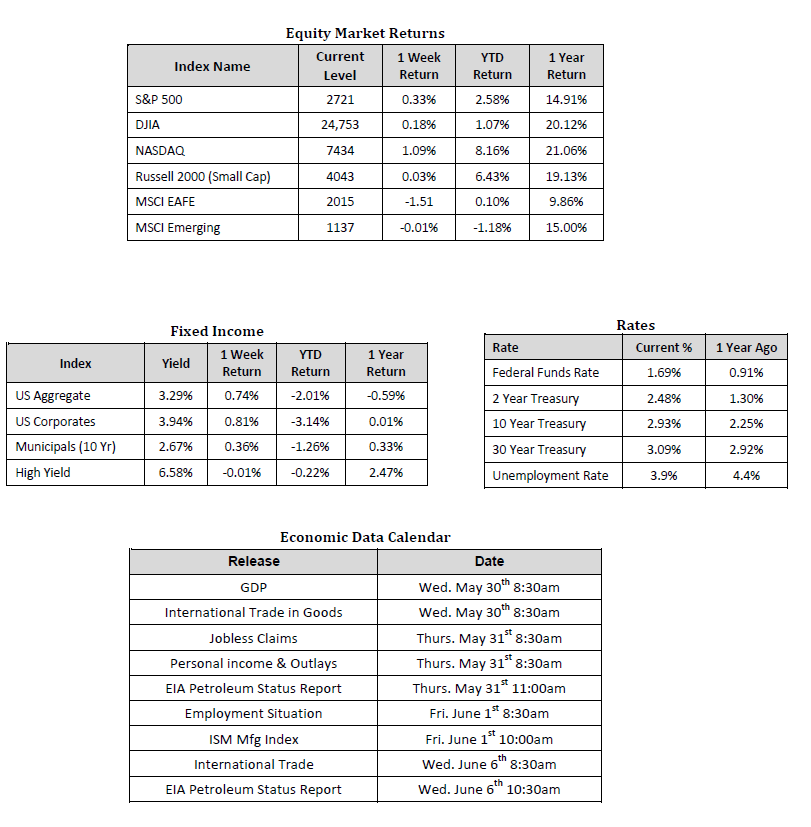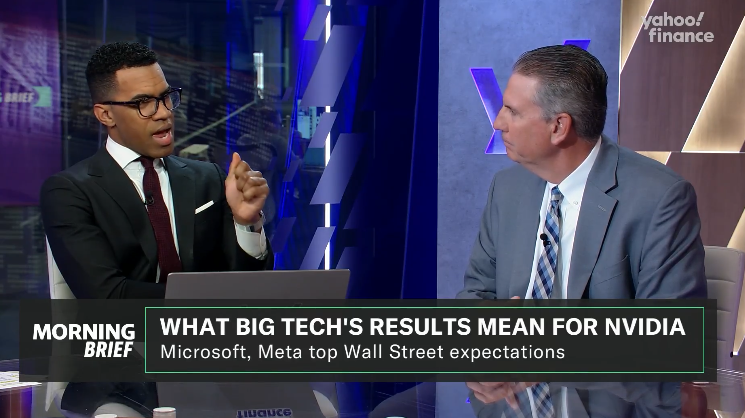
U.S. Stocks Finish the Week Higher Despite Geopolitical Concerns
Market Overview

Sources: Sources for data in tables: Equity Market and Fixed Income returns are from JP Morgan as of 05/25/18. Rates and Economic Calendar Data from Bloomberg as of 05/29/18. International developed markets measured by the MSCI EAFE Index, emerging markets measured by the MSCI EM Index. Sector performance is measured using GICS methodology.
Happening Now
U.S. equities fluctuated in the week leading up to the Memorial Day weekend. However, the major averages were still able to finish the week in positive territory. The technology-heavy NASDAQ index led the way returning 1.09% for the week followed by the S&P 500 Index and the Dow Jones Industrial Average, which posted gains of 0.33% and 0.18% respectively. On the other hand, the 10 year U.S. Treasury yield fell back below the 3% mark to end the week at 2.93%. It would appear that geopolitical concerns and the general “risk off” sentiment of last week brought in the buyers and drove bond prices back up, and their associated yields back down, to their current levels.
On the other side of the world, we saw some weakness in the Euro zone last week reflected by a 1.51% drop in the MSCI EAFE Index, which is heavily weighted towards developed European countries. Despite the sell-off, our outlook for the year remains positive for the region in part due to falling unemployment, high levels of consumer confidence, increasing wage growth and an accommodative central bank.
Turning our focus back to the U.S., while economic data continues to look healthy, the markets continue to react to geopolitical updates and headline risks. Just last week we saw markets push higher following a release by the U.S. Treasury Secretary that indicated that the “trade war” between the U.S. and China had been put on hold…only to be reversed as President Trump tempered those expectations later in the week. Lingering trade war concerns have apparently spilled into the shortened trading session this week as well. Markets opened lower on Monday with geopolitical angst coming this time from overseas – Italy in particular. It will be a busy week of domestic data releases and we look forward to reviewing hard numbers, and not speculative rhetoric, in addition to assessing the on-going developments in Italy.
Despite on-going uncertainties over trade, tariffs, or even potential summits with other foreign leaders, investors would be wise to remember to keep in mind that the global economic foundation remains relatively strong at this point in time. Short bouts of market volatility can be expected as we move forward but should not necessarily scare off investors, absent a more substantial market or geopolitical event, and could even lead to potential buying opportunities in certain areas as appropriate. That being said, portfolio diversification becomes increasingly important in times of heightened uncertainty, and we encourage investors to revisit the diversification that may, or may not, be in place within their existing portfolios.
Important Information and Disclaimers
Disclosures: Hennion & Walsh is the sponsor of SmartTrust® Unit Investment Trusts (UITs). For more information on SmartTrust® UITs, please visit www.smarttrustuit.com. The overview above is for informational purposes and is not an offer to sell or a solicitation of an offer to buy any SmartTrust® UITs. Investors should consider the Trust’s investment objective, risks, charges and expenses carefully before investing. The prospectus contains this and other information relevant to an investment in the Trust and investors should read the prospectus carefully before they invest.
Investing in foreign securities presents certain risks not associated with domestic investments, such as currency fluctuation, political and economic instability, and different accounting standards. This may result in greater share price volatility. These risks are heightened in emerging markets.
There are special risks associated with an investment in real estate, including credit risk, interest rate fluctuations and the impact of varied economic conditions. Distributions from REIT investments are taxed at the owner’s tax bracket.
The prices of small company and mid cap stocks are generally more volatile than large company stocks. They often involve higher risks because smaller companies may lack the management expertise, financial resources, product diversification and competitive strengths to endure adverse economic conditions.
Investing in commodities is not suitable for all investors. Exposure to the commodities markets may subject an investment to greater share price volatility than an investment in traditional equity or debt securities. Investments in commodities may be affected by changes in overall market movements, commodity index volatility, changes in interest rates or factors affecting a particular industry or commodity.
Products that invest in commodities may employ more complex strategies which may expose investors to additional risks.
Investing in fixed income securities involves certain risks such as market risk if sold prior to maturity and credit risk especially if investing in high yield bonds, which have lower ratings and are subject to greater volatility. All fixed income investments may be worth less than original cost upon redemption or maturity. Bond Prices fluctuate inversely to changes in interest rates. Therefore, a general rise in interest rates can result in the decline of the value of your investment.
Definitions
MSCI- EAFE: The Morgan Stanley Capital International Europe, Australasia and Far East Index, a free float-adjusted market capitalization index that is designed to measure developed-market equity performance, excluding the United States and Canada.
MSCI-Emerging Markets: The Morgan Stanley Capital International Emerging Market Index, is a free float-adjusted market capitalization index that is designed to measure the performance of global emerging markets of about 25 emerging economies.
Russell 3000: The Russell 3000 measures the performance of the 3000 largest US companies based on total market capitalization and represents about 98% of the investible US Equity market.
ML BOFA US Corp Mstr [Merill Lynch US Corporate Master]: The Merrill Lynch Corporate Master Market Index is a statistical composite tracking the performance of the entire US corporate bond market over time.
ML Muni Master [Merill Lynch US Corporate Master]: The Merrill Lynch Municipal Bond Master Index is a broad measure of the municipal fixed income market.
Investors cannot directly purchase any index.
LIBOR, London Interbank Offered Rate, is the rate of interest at which banks offer to lend money to one another in the wholesale money markets in London.
The Dow Jones Industrial Average is an unweighted index of 30 “blue-chip” industrial U.S. stocks.
The S&P Midcap 400 Index is a capitalization-weighted index measuring the performance of the mid-range sector of the U.S. stock market, and represents approximately 7% of the total market value of U.S. equities. Companies in the Index fall between S&P 500 Index and the S&P SmallCap 600 Index in size: between $1-4 billion.
DJ Equity REIT Index represents all publicly traded real estate investment trusts in the Dow Jones U.S. stock universe classified as Equity REITs according to the S&P Dow Jones Indices REIT Industry Classification Hierarchy. These companies are REITs that primarily own and operate income-producing real estate.



